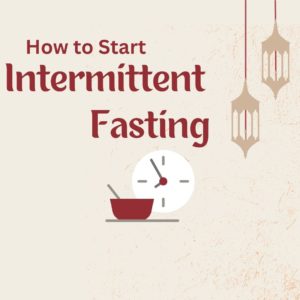Starting an intermittent fasting routine is a great way to lose weight and improve your health in numerous ways. We have created this comprehensive guide covering everything you need to know, from the basics of intermittent fasting to tips for a successful journey.
Why Change When you eat?
So what is intermittent fasting? And why has intermittent fasting gained immense popularity as an effective and sustainable approach to weight management and overall health improvement? Well, intermittent fasting or IF involves alternating periods of eating and fasting, offering several potential health benefits.
The aim of this article is to dive into the details of intermittent fasting and provide a step-by-step guide for beginners on how to get started. Or perhaps you are looking to refine your fasting routine and adjust your fasts for longer or shorter periods. Wherever you are on your fasting journey this guide is for you. So, let’s embark on this journey to a healthier life through intermittent fasting!
Start an Intermittent Fasting Routine
Understanding Intermittent Fasting
Before diving into the “how,” let’s understand the “what” and “why” of intermittent fasting. Intermittent fasting is not a diet; instead, it’s an eating pattern that focuses on when you eat rather than what you eat. By consciously controlling the time window for eating and fasting, your body undergoes beneficial metabolic changes. Intermittent fasting can be used to safely manage weight loss as well as various health challenges. We advise those with serious health challenges to consult with their health practitioner before embarking on a new fasting routine.
Types of Intermittent Fasting
There are several popular methods of intermittent fasting, each with unique fasting and eating windows. Let’s explore a few:
16/8 Method
This involves fasting for 16 hours a day and restricting your eating window to 8 hours. It’s one of the most common and beginner-friendly approaches.
5:2 Diet:
With the 5:2 diet, five days a week you eat normally and consume very few calories (around 500-600) on the other two non-consecutive days.
Eat-Stop-Eat:
This approach involves fasting for a full 24 hours once or twice a week.
Alternate-Day Fasting:
As the name suggests, you alternate between fasting days and regular eating days.
Benefits of Intermittent Fasting
Intermittent fasting offers a number of health benefits, for your physical and mental well-being. Some of these benefits include:
- Weight loss and fat reduction
- Improved insulin sensitivity
- Enhanced brain health and cognitive function
- Increased energy and focus
- Cellular repair and autophagy
- Reduced inflammation
The benefits of intermittent fasting are achieved by reducing the eating window (i.e 16/8) allowing the body to switch into a fat burning or energy burning state. Balancing the blood sugar levels (improved insulin sensitivity). As well as allowing the digestive system to rest and encourage cellular repair, autophagy, brain health as well as increased energy and focus. Intermittent Fasting is backed by science, proving Intermittent Fasting as an effective tool for improved health and well being.
How to achieve the best results with Intermittent Fasting
Preparing Yourself Mentally
Starting intermittent fasting requires mental preparation, since it involves breaking away from conventional eating patterns. Here are some tips to get you mentally ready:
- Set clear goals and understand your reasons for fasting.
- Educate yourself about intermittent fasting and its benefits.
- Gradually ease into fasting to allow your body to adapt.
Creating a Fasting Schedule
- Determine Your Fasting Window: Choose the type of intermittent fasting that suits your lifestyle best and decide on the fasting hours. When choosing a fasting window remember there are several types of intermittent fasting routines. For the ultimate success, gradually ease into fasting. Perhaps starting with 13/11 on the first day and building up to 16/8 over a period of 7-14 days.
- Select the Right Time: Ideally, plan your fasting window during hours when you can stay occupied and avoid social eating situations. It is important not to develop unhealthy eating habits, so always ensure your health and wellbeing are a priority over fasting. You can always return to fasting after social events such as holiday/wedding/night out.
Staying Hydrated During Fasting
It’s crucial to stay well hydrated during fasting to support your body’s functions. Water, herbal teas, and black coffee (without sweeteners) are excellent choices to keep you hydrated without breaking your fast.
How to break a Fast
Always aim to break your fast mindfully when your fasting window ends. It is best to opt for nutrient-dense foods, such as fruits, vegetables, lean proteins, and healthy fats. Whilst avoiding processed or sugary foods this will help you to reap the maximum benefits of fasting.
Can I exercise while Fasting
- Low-Intensity Exercise: Engaging in exercise such as walking, yoga, or stretching during fasting periods. To help improve your weight loss and keep you active during fasting.
- High-Intensity Exercise: Aerobic and HITT are best scheduled during your eating window to fuel your body effectively.
How to deal with Challenges and avoid Mistakes
Intermittent fasting may pose some challenges initially, but with perseverance, you can overcome them. When you first start fasting it is normal to feel hunger pangs as your body starts to adjust to this new routine. Staying hydrated with water and other low-calorie drinks will help your body whilst not breaking your fast.
When you break your fast, practice mindful eating and avoid processed and unhealthy foods. Aim to eat a balanced diet during your eating periods.
It is also important to keep track of your intermittent fasting journey to assess its effectiveness. Monitor your weight, energy levels, and overall well-being. Remember that results may vary from person to person, so be patient and stay committed.
FAQs
- Is intermittent fasting suitable for everyone? Intermittent fasting may not be suitable for pregnant or breastfeeding women, individuals with eating disorders, or those with specific medical conditions. It’s best to consult with a healthcare professional before starting.
- Can I drink water during fasting hours? Yes, staying hydrated is essential during fasting hours. Water, herbal teas, and black coffee without sweeteners are allowed and won’t break your fast.
- Will intermittent fasting slow down my metabolism? No, intermittent fasting can actually improve metabolic health and boost fat burning.
- Can I exercise during fasting periods? Yes, you can engage in low-intensity exercises during fasting periods. However, high-intensity workouts are better scheduled during eating windows.
- How long before I see results? Results vary depending on individual factors, but many people notice positive changes within a few weeks of consistent fasting.
- Can intermittent fasting help with weight loss? Yes, intermittent fasting can be an effective tool for weight loss, especially when combined with a balanced diet and regular exercise.
Get Fasting
You are now equipped with the knowledge and tips to start your intermittent fasting journey. Remember, intermittent fasting is not a quick fix but a lifestyle change that can yield significant health benefits when practiced consistently and mindfully. Stay committed, listen to your body, and enjoy the journey to a healthier, happier you.




